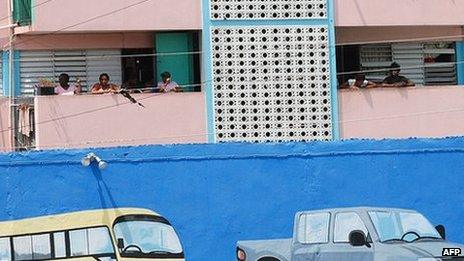Jamaica divided on role of Christopher 'Dudus' Coke
- Published

The Tivoli Gardens flats saw heavy fighting during the battle to arrest Coke
With the sentencing by a US court of Jamaican drug lord Christopher "Dudus" Coke, who has pleaded guilty to racketeering, the BBC's Nick Davis reports from Kingston, where he covered the fierce fighting ahead of Coke's arrest two years ago.
Tivoli Gardens is a concrete inner city housing complex built in the 1960s, close to Kingston's waterfront.
Heavily armed police stand guard at one entrance to the community, and there is a military outpost near another way in - a visible sign that things will never be the same again.
You can still see the bullet holes from the state of emergency on the facades of some of the low-rise apartment blocks.
In May 2010, the hustle and bustle of central Kingston was replaced by gunfire as armed gangs barricaded the area and confronted the security forces.
More than 70 people, many of them local, died in the military operation to capture Christopher "Dudus" Coke .
'Like Iraq'
In the stairwell of a building, a group of men playing dominoes describe what happened.
"The soldiers shot me, twice in the leg I got hit," says one man. "It was like Afghanistan, like Iraq," says another.
Across the road, there is a similar scene: a group of women are playing cards for cash. As they deal, they shout praise for Dudus. He clearly still has a lot of support in Tivoli.
Under his control, the area was a state within a state. People here never paid for electricity, as the power company staff did not dare to come in and disconnect the illegal supplies.
"He made sure I stayed out of trouble and paid for my schooling. He was even going to pay for me to go to pilot school," one teenager says. Another says: "He was like my father, I hope they let him come back soon."
Built to house supporters of the Jamaica Labour Party, Tivoli Gardens is a "garrison community", an area where politicians had formed alliances with local gang leaders to ensure the population's total support at the polls.
Dudus inherited Tivoli from his father, who was the "Don", or crime boss, here. He poured money into the community through the lucrative construction contracts he won from the government and from crime.
For those who lived in the area it was safe. Rape and burglary were said to be rare. Police statistics suggest it has one of the lowest crime rates in Kingston and the surrounding area.
But a few miles up the road, in New Kingston, the commercial district of the capital, there is little support for Dudus, especially as his imprisonment led to a dramatic fall in crime.
"I was for the incursion [into Tivoli Gardens] and it was good for Jamaica because it has boost our morale and our economy has gone up", says one man. "Since he was taken, crime has fallen so much".
"Insecurity in Tivoli Gardens has to be balanced up against improved security in the rest of Jamaica. Tivoli Gardens had become a safe haven for criminals, not only members of the Shower Posse [run by Coke], but for criminals island-wide," says Peter Bunting, National Security Minister.
Jamaica has been battling crime for decades, but the figures have been trending downwards in the last couple of years. Murders peaked at more than 1,600 killings in 2009, but had fallen to an eight-year low in 2011.
But with more than 250 criminal gangs operating on the island, violent crime is still a big problem.
New hiding places
On the outskirts of Spanish Town, a joint police and military operation earlier this year saw suspects, overwhelmingly young men, being rounded up and taken into custody.
This has long been the main hotspot for gang crime in Jamaica, but as the soldiers searched homes and flushed out the criminals, they found new hiding places in rural areas like Linstead - a traditional farming community an hour and a half out of Kingston.
Crime was unheard of here before, but is a growing problem as the gangs target the countryside.
"We used to wonder at times what crime was like. We used to hear it on the news. Now we are experiencing it for ourselves and our lives have drastically changed," says Richard Williams, whose home has been broken into repeatedly.
"People here must know the gunmen, so we have our part to play. We need to start passing on information to the relevant authorities and then we'll see this get better."
Extortion and arson are now a problem in these communities and the job of dealing with them belongs to Jamaica's commissioner of police.
"The gangs are adaptable and flexible and when they're under pressure in one area they will move to another - this is not unique to Jamaica, it's all over the world. It's something as a country we have to deal with," says Commissioner Owen Ellington.
Jamaica's government says it wants to lower crime from 41 murders for every 100,000 Jamaicans to 12 per 100,000 in the next five years.
It will be a major job.
People here are aware that Christopher "Dudus" Coke will be spending a long time in jail, but hope Jamaica's battle against its criminals does not take even longer.
- Published1 September 2011
- Published27 May 2010
- Published28 May 2010